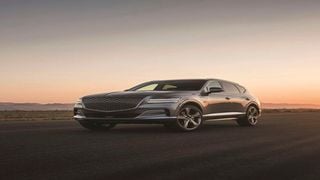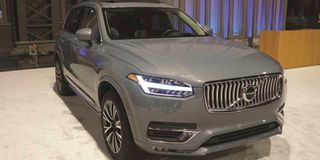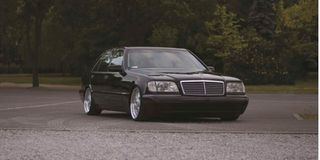
A 2021 Genesis GV80 Luxury SUV.
| ShutterstockDN2
Premium
Did the GV80 really save Tiger Wood’s life?
What you need to know:
- That is not a vehicle that sells in this market, so it's largely irrelevant for me to focus on it.
Dear Barasa,
Could you give your insight for the benefit of my pubmates regarding some discussions we recently had? In a nutshell, this is what it was all about: Forbes had a recent article about the GV80 “The car that may have saved Tiger Woods”.
Reading the article smirked of commercialisation of the accident, and even one KoT quipped that Barasa could have done a good job. I don’t know how, but upon reading the article, Forbes really put in a compelling ad for the behemoth.
If indeed he was saved by the superior tech/features of the car, where would the moral compass point if Hyundai used the unfortunate accident to their own marketing advantage?
In more fatal circumstances (Boeing 777s current affairs and Princess Diana/W124 conspiracies come to mind), the public fault-finders are generally quick to hang the manufacture(s) out to dry. Should we also praise stand out tech/features that save lives?
While accidents are unfortunate, opinion shapers should look at them objectively as a learning curve both for drivers and manufactures. The aviation industry does this all the time.
Speaking of airplanes, care to introduce a column for jet fuel heads?
Speedy recovery to El Tigre.
Warm regards,
Willies
Hi Willies,
Bar talk tends to be one of the most interesting kinds. Many people believe that alcohol makes human beings more honest - there is even a Latin saying for this: in vino veritas, in wine there is truth.
However, I have heard more fibs and falsehoods being peddled in bars than the truth, none more so than in the field of motoring. But that dipsomaniac council of war you participated in about a famous philanderer who plays golf in his spare time may be on to something.
We live in the day and age of public relations, spanning everything from press releases to product placements to social media "likes" and "follows". Companies love to put a PR spin to everything, even those that don't necessarily touch on them. I wouldn't put it past Hyundai to dabble in a bit of public relations shenanigans once in a while or when the opportunity arises.
It's one thing to come out and say "Our car saved the tiger's life", and that thing is "tasteless". So how do you say it without actually saying anything? Pay someone else to say it. But how do you pay someone else to say it? You could invite them over for coffee at a nondescript middling café where one is unknown and unlikely to meet other ad executives or auto industry management types and slip a brown envelope in their direction (hence the name "brown envelope journalism"). But that is still a bit too on the nose and lacks finesse. There is another method.
Introduce the carrot and the stick. The carrot is the pile of money in that envelope, disguised as an advertising account, more often than not the premium type. We will advertise enthusiastically in your publication, and pay even more enthusiastically for that package. It's not a bribe, it's honest business; wink, wink.
All you have to do is write an article spinning the awesomeness of our car into the ineptitude of this serial womaniser. The guy can swing a stick like a master - a golf stick you moron, get your mind out of the gutter - but he can't drive to save his life, poor sod.
Well, our car saved his life for him so that he can continue pursuing women who should know better than yield to his handsomeness, wealth and fame. Do we sound jealous?
What about the stick? The stick is the corollary, which simply states that the converse holds true. If you don't feel like writing a thinly disguised puff piece about this car of ours that is selling very well even without the help of tone-deaf PR shenanigans, we WON'T advertise in your weak little publication. Not just premium advertising, we won't advertise AT ALL.
Good luck finding a premium advertiser for print publications in the 21st year of the 21st century, the reading culture is dead, you hear me? Dead. As a dodo. You need this money, you unwashed editor, so if you are smart you should have already started writing that article in your head before we are done talking to you. How many words in are you so far?
"It's halfway done, I just need pictures of the Wooden wreckage."
"Our car is not wooden!"
"It's a pun, you overpaid yuppie. It wasn't a real tiger driving your Korean car, and of course the car itself is not wooden. Lord! Read more. You chaps are the reason the literary culture is dead. No beauty of language, no turn of phrase, everything reads like a Wikipedia page whose author cannot lay claim to being unbiased. Goodness!"

A 2020-Genesis-GV80.
"Let us know where to wire the money. And feel free to apply for a job at our place, print industry is dying or already dead and you'll soon be unemployed. You NEED us."
Of course that is not how the conversation between Hyundai and Forbes went, or if one even took place to begin with. You see, there could be something else at play.
Yes, the motoring industry is hot stuff right now, second only to the development of the Covid-19 vaccine. With electrification and self-driving, all eyes are on me and my posse, the industry experts.
Anybody who wants to sound informed and techy all at once no longer discusses computer motherboards and block chains, they talk about short-selling TSLA (Tesla Motors' listing at whatever stock exchange they trade at) and why Apple, Inc. will fail in their attempt at building a competitive motor vehicle because of their totally unnecessary and extremely irritating reliance on and insistence on using proprietary hardware that wouldn't hurt them a single bit if they standardised it to gel with existing mobile phone technology.
So what is a journalist, head balding and eyes darkening at the looming thought of professional extinction, to do when he learns that an intercourse champion (he has won many championships on several different golf courses, pervert) has crashed his car?
Focus on the car, instead of the cause of the crash, or even the social and financial implications of Tiger's lead role in an embarrassing incident. Write a scum-sucking repartee with two goals in mind: get enough eyes on that article to warrant the passage of a rapidly dwindling paycheck to sweaty palms at the end of the month, and hope desperately that the fawning piece will tug hard enough at the heartstrings of the overpaid PR people for them to say:
"Oh, look, the guy is being very kind to us despite our vehicle being involved in a high profile traffic incident, you think we should grant him a free car or we just give him a small 'token of appreciation' that isn't enough to buy insurance cover for that car? Let's go with the token, the profit margins on the GV80 are off the charts, we can't afford freebies right now. And Tiger is coming back to replace his stricken vehicle, so chalk that up as yet another sale. We're gonna be rich!!"
It's possible that this didn't happen either, I'm just creating potential scenarios behind that article that your pub-mates are casting aspersions on. Besides entrepreneurship, fatherhood and consultancy, I am also a novelist, so there.
The #KoT (Kenyans On Twitter) are right as well: I could have done a better job, and with good reason. I have been reviewing cars professionally for 12 years now, with international recognition (but do I say). I was also the proud recipient of a scholarship from the WHO (World Health Organization) to train on something called Global Road Safety Leadership at Johns Hopkins University in Baltimore, Maryland (which is in the Democratic Sovereign Kingdom of the People's Republic of the United Non-Arab Emirates of Americalandistan) and the group I was attached to walked away with the laudable achievement of coming up with the most effective and engaging road safety strategy which was the final test in our coursework, edging out everybody else to take the win. It's one of my proudest moments and I have the certification to prove it.
Speaking of coursework, part of the month-long training involved a visit to the famous IIHS where they do crash-testing of motor vehicles to rate their safety standards, so I know a thing or two about how cars behave in crashes, and the answer to your question is yes, some of these safety features and technology available on modern cars do deserve praise.
It's why Volvo is famous globally for being a safe car, and the Subaru Forester is a darling at most testing facilities. These are very safe cars to crash in.

A grey 2020 Volvo XC90 T6 SUV.
I need to drive it first...
As for the GV80? Will I write a neutral, non-commercialised article on what happened when circumstances exceeded Mr Wood's skill set and how the vehicle handled the deteriorating situation?
No I will not.
That is not a vehicle that sells in this market, so it's largely irrelevant for me to focus on it. Yes, I have a global presence, but charity begins at home.
Secondly, for me (my company) to come up with an authoritative piece on that crash, I need to be closer to it: have access to first responders, traffic reports, perhaps look at the car itself. That is not happening either.

Subaru Forester.
Thirdly, the moment has passed. In this age of PR and social media, it pays to go with the tempo of the zeitgeist, once a moment has passed, it's gone, and bringing it back up is just flogging a dead horse, and one might find oneself trending for the wrong reasons, under the hash tags #Desperate #OutOfContent #TryingToStayRelevant #WhereIsTheCreativity #HistoricalMuch? #FireThisGuy #WasteOfData #RefundMySubscriptionFees. I am not struggling for relevance nor have I run out of things to write about.
P.S: The late Princess Diana passed away in a W140, not a W124, but yes, either way it was a heavily overbuilt Mercedes-Benz saloon from the early '90s when Mercedes built leather-lined and sunroof-equipped Panzer tanks and sold them to the public disguised as saloon cars...

A Mercedes S-klasse W140.
You are right about the need for opinion shapers to maintain objectivity, but that is a rare thing to find nowadays, especially where money is involved, and #influencer culture means money talks all the time.
This column is one of the few places you will find objectivity, no matter how many toes it steps on, however, I cannot insist this enough: the two fictional scenarios I painted above are simply hypothetical and do not carry any authoritative intent even though they do carry a bearing on reality.
I'm just presenting possibilities based on what I know and observe going on around me, but it does not mean I am lobbing accusations at either Hyundai or Forbes. I still have a lot of respect for both companies, more so given that both companies occupy a large part of my professional life: one is in the automotive space, the other is in publishing.





